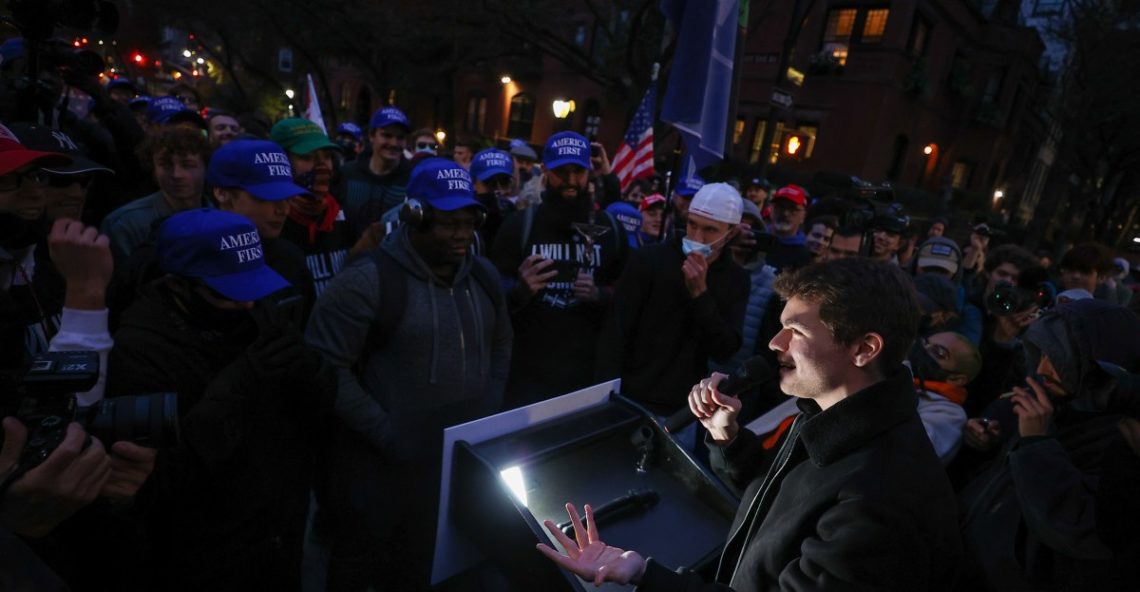On October 8, two of the biggest voices in right-wing media sat down for a nearly four-hour chat. The host was Dave Smith, a libertarian Jewish comedian who has made a name for himself as a vocal critic of Israel’s war in Gaza. His guest was Nick Fuentes, a leader of the antisemitic “Groyper” movement that has become increasingly popular among the rank-and-file of the MAGA movement.
Early in the conversation, Smith addressed the elephant in the room: Why was he, a Jewish comedian, hosting someone like Fuentes on his show? Smith’s answer was that their shared policy views, most notably on Gaza, were more important to him than Fuentes’ hatred.
“I don’t actually think bigotry is the worst thing. It can be bad, but it’s not the worst thing,” Smith said. “As a Jewish person…there’s these people who hate Jews, I should probably be cool. Because it’s kind of hard for people to hate people who are cool to them.”
In response, Fuentes painted himself as a misunderstood victim of cancel culture. Leading right-wing voices like Ben Shapiro and Jordan Peterson were, in Fuentes’ telling, unfairly persecuting him based on selective and inaccurate quotations.
“People are hanged by their words selectively,” Fuentes said. “These are tools of reputational destruction. They don’t like where you’re pointed, so they look for things that are going to hurt people’s feelings.”
Around the same time, on his own show, Fuentes did a brief monologue on the historic origins of antisemitism. In his view, the story is simple: Jews deserve it.
“What is Jew synonymous with, as a verb? It means to cheat, to lie, act in bad faith as though it’s second nature. Where do you think that comes from?” Fuentes said. “Everybody, in every nation, in all times, for thousands of years, eventually comes to the conclusion that Jews always act in bad faith.”
This was par for the course for Fuentes: a man who has described Hitler as “awesome” and suggested Jews should be forced to either leave America or convert to Christianity. He had not been selectively quoted or incidentally bigoted: blaming America’s problems on its Jews has been his cause for nearly a decade. No amount of acting “cool” on Smith’s part would make Fuentes reconsider his hatred of Jews.
But Smith’s cartoonish naïveté betrays a deeper problem: a rising antisemitism crisis on the MAGA right that is largely of the party’s own making, one that risks raising people like Fuentes to new heights of influence And the GOP’s elites are now struggling to contain it.
The leak of internal Republican group chats to Politico, including messages sent by a prominent Trump administration official named Paul Ingrassia, revealed numerous messages containing explicit bigotry and even praise for Hitler. It is not just the existence of these texts that’s notable, but the fact that they leaked at all — which indicates that someone on the right, who was in these conversations, wanted to try and push their internal enemies out.
Indeed, there is real and growing recognition — at conservatism’s highest levels — that they have an antisemitism problem.
Chris Rufo, the Trump right’s leading activist on social issues, warned in March of “influential online commentators” who were selling “diffused, right-coded conspiracy theory” in which Jews “have taken control of American media, flooded society with pornography, and organized sex-related blackmail rings to secure support for Israel.”
Shapiro offered a similar diagnosis in a recent interview with the Jerusalem Post. “There is a part of the Right that is extraordinarily conspiratorial and sees Jews as a conspiratorial force,” he said. “You get a lot more likes and clicks if you are promoting an anti-Israel, anti-Jewish agenda than if you are doing the opposite.”
These concerns typically focus on influencers and public figures: Fuentes, obviously, but also Tucker Carlson, Candace Owens, Kanye West, Darryl Cooper, Andrew Tate and Rep. Marjorie Taylor Green (R-GA). The basic idea, according to people like Shapiro and Rufo, is that these figures are the source of the rot manifested in those group chats, a cancer on the GOP who need to be confronted and potentially even excised from the broader right.
Yet this raises a deeper, and more troubling, question: Why is it that they’ve been able to build such a large audience? Why do “you get a lot more clicks” nowadays if you promote right-coded antisemitism? And why is it that so many of the party’s youth operatives get seduced by neo-Nazism?
The answer, according to both publicly available research and my own conversations with prominent right-wingers, is distressingly simple: President Donald Trump has turned the right into the premier home for conspiratorial extremism.
While the left has its own struggles with antisemitism, especially as it relates to rising anti-Zionist sentiment, the right is tapping into an older and more traditional form of Jew-hatred — one with a long presence in American politics that, until recently, was seen as taboo for anyone approaching the mainstream.
But in the Trump era, attitudes like Smith’s — that bigotry isn’t “the worst thing” — have become normative, a kind of anti-anti-racism that holds the Trumpist political coalition together. This “no enemies to the right” politics — shown most starkly, perhaps, by Vice President JD Vance’s refusal to forcefully condemn the infamous Young Republicans group chat — combined with the technological revolution in streaming video and crowdfunding, unfurled a red carpet for America’s antisemites to use as they goose-stepped their way to more wealth, influence, and power.
“It’s not even ‘no guardrails’ — it’s policing to make sure there aren’t guardrails,” says Richard Hanania, an influential writer on the right (and himself a former white nationalist forum poster).
As the problem becomes worse, and warnings from people like Rufo and Shapiro become more and more dire, there is a real chance that this conflict turns into a full-blown civil war — one pitting major and powerful factions of the right against each other, in a way that many previous intra-right conflicts have not.
The outcome of that struggle could well determine the future of both the Republican Party and American Jewry.
Part I: The market for antisemitism
In 2022, the scholars Eitan Hirsh and Laura Royden published a groundbreaking paper on the distribution of antisemitic attitudes across the ideological spectrum. Influential at the time, the paper now feels prescient — an anticipatory explanation of why, in 2025, promoting antisemitism has proven to be so popular with young conservative audiences.
The key finding relates to a survey, which asked 3,500 Americans whether they agreed with three statements about American Jews on a scale of 1 (strongly disagree) to 5 (strongly agree):
The responses revealed two very obvious patterns. First, right-wing Americans were more likely to agree with these statements than those on the left. Second, young people were more likely to agree than older people.
In a follow-up paper, Hersh and Royden explored a striking racial pattern in the results. On both the left and the right, Black and Latino Americans were more likely than their white peers to agree with antisemitic statements. Today, it seems, the Americans most likely to express antisemitic attitudes are Black or Latino conservatives between the ages of 18 and 30.
In 2022, these results presented something of a puzzle. But after the 2024 election results, in which Trump shifted notable numbers of young and Latino voters into his camp, you can start to see a coherent explanation — one that also explains the surge of antisemitism on the young right.
There is substantial evidence that Trump does unusually well with voters who have low levels of social and political trust: little faith in government, experts, and even their fellow citizens. Over the course of ten years in politics, Trump has made the GOP the primary home for such low-trust voters, who used to be found more evenly across the political spectrum. In 2024, it seems likely that his gains among young and nonwhite voters came directly from their lowest-trust ranks.
Low trust is also, unsurprisingly, closely correlated with belief in conspiracy theories. And that is, at its heart, what antisemitism is: a 3,000-year-old conspiracy theory positing that everything bad in the world can be blamed on the secret and shady manipulations of a small group (i.e., the Jews).
Antisemitic texts are, historically speaking, the foundational basis of the modern pattern of thought and argument — the odd-stringing together of unrelated facts, the assertion of the corruption of mainstream narratives — that define everything from UFOlogy to vaccine denial. In his book Conspiracy Theories, psychologist Jovan Byford explains how this history causes modern conspiracy theorists to almost inevitably alight on Jews as the ultimate culprit:
Between the mid-nineteenth century and the end of the Second World War, antisemitism was the dominant motif in conspiracy theories. Much of the conspiratorial literature of that period, but also about that period, revolves around the idea of a Jewish conspiracy. This means that, when authors today reflect on the history of the plot — a task that requires them to recognize the relevance of past conspiracies and past conspiracy theories — they invariably come into contact with the antisemitic legacy of the conspiracy culture.
When you put all of this together, you get a complete theory of why young conservatives — and especially young, nonwhite conservatives — have become America’s most antisemitic demographics.
Part of what it means to be a young conservative now is to have deep and profound distrust for established authorities and official narratives, to believe that the truth is what “they” don’t want you to know. In 2023, the conservative writer Mary Katharine Ham gave a simple answer when asked why conservatives have grown mistrustful of institutions: “in large part because the institutions deserve it.”
Since young people are disproportionate consumers of online content and influencers, that makes it their world the natural habitat for right-wing antisemites looking to build a mass audience. People like Fuentes, Owens, and Carlson are all able to build an audience on these platforms because they can connect directly with an audience that’s interested in a distinctly right-wing variant of anti-semitism — conspiratorial and ethno-nationalist. Hence why Fuentes’ show is titled America First.
“There is populist spirit — a collection of cognitive traits — that makes someone want to be part of the populist Trump era GOP. It’s conspiratorial, it’s ethnonationalist,” Hanania says. “And historically, have conspiratorial ethnonationalist movements liked Jews? No. That’s just the natural progression for where this is going.”
Part II: A climate of malign tolerance
None of this is meant to absolve the American left of antisemitism. After October 7, that would be absurd. The celebrations of that day’s murder and bullying of Jewish students by members of pro-Palestinian activist groups reflect a very serious problem, one I’ve highlighted before. And historically, conspiratorial antisemitism can easily come in left-wing varieties (just look at the Soviet Union).
But there is a fact-pattern in need of explanation. It is on the right where explicit antisemites like Fuentes flourish, where more conspiratorial figures like Carlson get to speak at the party’s national convention, and where young operatives are texting each other about how much they love Hitler. For all of the left’s very real problems, there is nothing like the institutional architecture for left-coded antisemitism as what exists for its rightwing variants
That is, I think, a partly function of demographic demand. While Democrats are turning on Israel after the Gaza war — in ways that make them more tolerant of anti-Zionist discourse, perhaps even when it veers into antisemitism — Democrats are generally more likely to trust expert sources of knowledge rather than podcasters peddling the “real truth” that “they” are hiding from you.
But this is also a function of elite control over supply. For all its faults, the Democratic Party, and aligned left-wing institutions, have built a coalition that ruthlessly enforces anti-bigotry norms within their ranks. One of the biggest knocks on the American left in the past few years, in fact, is that it enforces these norms too aggressively; hence the entire debate around “wokeness.” This is not, to put it mildly, an environment likely to produce major figures who talk like Fuentes.
The Trump-era Republican Party, by contrast, has defined itself by hostility to those norms. Trump’s entire political career has been an exercise in pushing policy and political boundaries into territories that were, at first, widely considered beyond the pale — from birtherism to the Muslim ban to “shithole countries” to ICE detaining Latino citizens on racial grounds.
While not every conservative approved of Trump’s policies or rhetoric, nearly all of them opposed the left’s reactive cries of “bigot!” This anti-wokeness — or anti-anti-racism — is one of the key factors keeping the many different factions of the right in the same broad team, even though they sometimes hate each other almost as much as they hate the left.
You can see this, most visibly, in Vance’s aforementioned refusal to “join the pearl clutching” after the New York Young Republicans’ offensive texts were leaked. It is not just that he falsely dismissed the adult chat participants’ pro-Hitler comments as indiscretions of young boys; it is that he framed it as part of a principled stance against cancel culture.
“I really don’t want us to grow up in a country where a kid telling a stupid joke — telling a very offensive, stupid joke — is cause to ruin their lives,” Vance said.
Among the many, often off-record conversations I had with elite conservatives while reporting this piece, their side’s hostility to policing bigotry came up again and again as a central factor in the rise of right-wing antisemitism.
“Something novel in the post-Trump right is that the tolerance of and refusal to condemn casual bigotry signals to young MAGA professionals that it’s safe to dabble in that kind of thing,” the conservative writer Daniel Foster says. “The theory advanced by people like Vance is that condemning that behavior is a trap set by bad-faith liberal media. But they’ve overlearned the lessons of the backlash against wokeness, or else they are employing that backlash cynically.”
Foster told me that, as far back as 20 years ago, he could recall occasions where participants at right-wing events would share “bad-taste or spicy jokes in the halls outside events or after-hours at the bars.” At the time, he treated them as “mostly harmless and sometimes even funny.” Now he thinks a bit differently.
“The end of what you might call respectability politics on the professional right, the end of gate-keeping against that sort of thing, has allowed some to reframe those jokes as attempts at bold truth-telling,” he tells me. “The self-policing against casual or ‘jokey’ bigotry really did serve a purpose. And the erosion of those taboos makes it more likely that the dabbling turns into something more serious and sinister.”
The right’s abandonment of self-policing is part of why the many, many signs of a rising antisemitism problem among young conservatives — years of conspiracy mongering about George Soros and migration, Fuentes and Kanye West’s dinner with Trump in 2022, or that Fuentes-style extremists had taken over more roughly 30 College Republicans chapters by 2023 — did not prompt soul-searching any sooner.
The right is so mistrustful of gatekeeping that it could not see that it had created a permission structure for some of its own elite talent to begin diving into antisemitic waters. Only now, when the scope of the problem has become undeniable, is a reckoning at hand.
Part III: How the right’s anti-antisemites fight back
A liberal observer might be inclined to think that, when it comes to antisemitism, the GOP is already lost. If you’ve got a party that’s fine with racial profiling of Latinos by ICE, putting white nationalists in high-ranking government positions, declaring trans identity itself a form of mental illness, and supporting president accused of sexual assault by dozens of women — how could mainstreaming antisemitism really be so far behind?
This line of thinking reflects a misunderstanding not only of the way the right thinks about itself, but of the balance of forces inside the party.
There are not, at this point, powerful constituencies inside the GOP dedicated to opposing harsh immigration enforcement or advancing trans rights. But there are influential members of the MAGA coalition who take issues relating to antisemitism and Israel very seriously. Such issues are among their top policy priorities, if not their singular most important one — to the point where they appear willing to go down fighting for them.
Jewish Republicans are the most obvious example. In the media, the anti-woke voices most alarmed by the rise of right-wing antisemitism are Jews like Shapiro and Bari Weiss. Both of these two run large media empires (the Daily Wire and CBS News, respectively), and dedicate real journalistic resources to attacking the Fuentes and Carlson types. There are also Jewish donors, like the billionaire Miriam Adelson, with obvious dogs in this fight.
Were these Jewish voices acting alone, even their positions of power in the movement would not be enough to save them. We have seen elite Republicans try to stand up against bigotry popular with the base in the past, and they have a losing record. But in this case, there is at least one real grassroots constituency likely to align with them: the millions of evangelical Christian Zionists.
The right’s debate on Jews is, inextricably, bound up with its debate over Israel. America First nationalists are not known for their concern about the suffering of foreigners, to put it mildly, but rising disapproval of Israeli crimes against Palestinians have given people like Owens and Carlson useful cover for diatribes against malign Jewish influence in America.
But while this tactic is useful for getting credulous interlocutors like Dave Smith to overlook bigotry, it does position themselves against the many Christian Zionists who make up a significant percentage of the GOP base. Their interest group, Christians United for Israel, claims to have 10 million members. This large and influential constituency is theologically opposed to any effort to degrade or sever the US-Israel alliance — and, at least in theory, deeply concerned about rising antisemitism. It’s a pretty powerful grassroots counterweight against the right’s Fuentes-pilled youth cadres.
But it’s not just the balance of forces that differentiates the right’s fight over antisemitism from other bigotries: it’s the role of Trump himself.
In the past, many of the right’s internal efforts to police boundaries on race and immigration were anti-Trump actions. This was by necessity, as they were trying to stop him or at least his policies. And in the current GOP, being anti-Trump is a one-way ticket to failure.
But an effort to police antisemitism will not necessarily run afoul of Trump himself. While he has a long record of antisemitic comments, antisemitism is not integral to his political persona in the way that being anti-immigrant is. Moreover, Trump finds positioning himself against antisemitism quite useful: it is one of the central pretexts in his campaign to impose political controls on higher education. So there are good reasons to doubt he will personally intervene in a right-wing civil war to defend Tucker Carlson.
And I do think “civil war” is the correct term for what’s brewing on the right.
Both sides of the divide over antisemitism are influential: they are backed by politically engaged supporters and have allies in powerful positions. The issues at stake here, Israel and Jewish-American inclusion, are vitally important to the various combatants — and it’s hard to see what a compromise might look like. Eventually the tension here will become unbearable. The sniping that we’re seeing now will turn into a concerted effort by one faction to push the other out of the Party’s coalitions.
This may happen as soon as the 2028 election; it may already be happening, in hard-to-detect ways that will one day be obvious in hindsight.
But when it happens, the outcome will be genuinely uncertain — and the stakes will astronomically high.
American Jews cannot be secure and stable in a country where an open Hitler-admirer like Nick Fuentes holds a position of influence in one of two major political parties. His triumph would not be a welcome rebuke to Israel’s far-right government, as Smith suggests, but a sign that even a country where Jews have lived as securely as anywhere in our long history could turn violently dangerous.
It wouldn’t be the first time.
The post The GOP’s antisemitism crisis appeared first on Vox.




